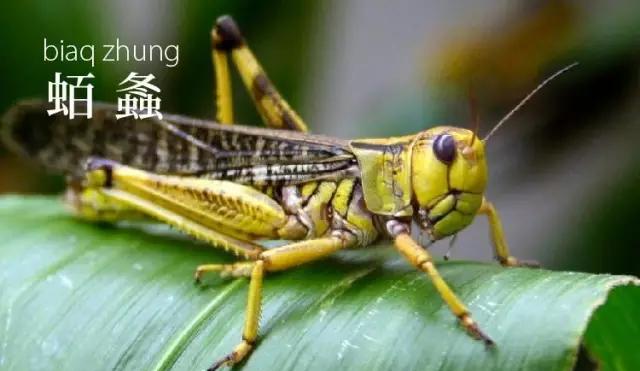Listen to voice with reading:
In Fenyang dialect, there are many animal and plant nouns with their own special names. Many nouns often cause people to "speak but not write" due to special inflections and special words. Today we will first introduce a few common insects.
First of all, the Fenyang people refer to insects as "cattle and cattle", which is actually not difficult to understand. The common feature of insects is that they have two antennae, which is very similar to the two horns of an ox, and we have so many overlapping words in the Fenyang dialect? As mentioned in the article, the Fenyang dialect uses overlapping words to indicate a small name, and "cow cow" is literally translated to mean "little cow", which is very graphic. Next, we will say a few "cows and cows" in the Fenyang dialect:
<h1 class="pgc-h-arrow-right" > 蛨螽 - pronounced biaq zhung</h1>

The Fenyang dialect calls locusts "biaq zhung", and the orthography is "蛨螽". 蛨, pronounced mò in Mandarin, is an inaccessible character, m and b vowels are easy to turn around, in fenyang dialect and its sound next to the "hundred" homophony. The notes on the "蛨" in the Ancient Script Book are as follows:
Worm, insect name. Vermiliers also. And sideways, the sound is narrow. Cicada genus. "Sayonara" grasshoppers, grass worms also. Detailed note. "Six Books of Truth" do not be a grasshopper.
In other words, "grasshopper" is a grasshopper, and in modern Chinese, grasshopper is a collective name for "locust" and "grasshopper". And "螽", pronounced zhōng in Mandarin, means locust in the dictionary:
Ant, "Sayonara" locust also. "Lu JieShu" now people call locusts as mantises, and Yanzhou people call them mantises
We can see that the Fenyang dialect uses the word "ant" to mean locust, which is very quaint.
<h1 class="pgc-h-arrow-right" > flat-dan- tone ban dan</h1>
After talking about locusts, talking about the insects similar to him, "grasshoppers", Fenyang dialect is called ban dan, which is actually the word "flat burden". Because grasshoppers are characterized by two pointed heads, similar to the shape of flattened shoulders. Some places in Shanxi call it "flat shoulder hook".
<h1 class="pgc-h-arrow-right" > lice- pronounced saq zeq</h1>
To be honest, lice are few and far between, with the improvement of people's hygiene conditions, but when I was a child, I often heard people say "Oh lice". "Lice" is pronounced shī zi in Mandarin, but "虱" is actually an inaccendiary word, Fenyang dialect read saq, and Mandarin is quite different, resulting in many people do not realize that "saq zeq" is "lice".
<h1 class="pgc-h-arrow-right" > tick - pronounced bieq saq</h1>
It is also the name of an insect with the word "lice", and the Fenyang dialect "tick" actually refers to bed bugs. Also because of the improvement of health conditions, it is difficult to see now, but we still often hear the saying "get the tick in the brain", which is used to describe people who are not bright in their minds and love to drill the horns.
<h1 class="pgc-h-arrow-right" > miaq fur</h1>
Ant, Fenyang dialect called miaq fur. The word is "ephemeral". The ancient dictionary Ji Yun has notes:
Cockroaches, insect names, ants also.
However, since the pronunciation of the word "蟞" should be piaq, from the phonetic variation, we are more inclined to be the consonant of "ant ant". This can also be seen in the dialects of other counties, such as Shanxi Jingle calling ants "grasshoppers", Lanxian "grasshoppers", etc.
<h1 class="pgc-h-arrow-right" >you 䗣 - pronounced iou xi</h1>
Behind the leaves of trees and flowers, you will sometimes see some shiny dark yellow dots, called iou xi in Fenyang dialect, which means aphid. Aphids have wax glands, can secrete honeydew, and look shiny and shiny, so people call it "oil"
"䗣" is pronounced hàn in Mandarin, which means insects on leaves in Old Chinese. Fenyang dialect has a type of word Mandarin read han, Fenyang dialect read xi. For example, "feet smell" Fenyang dialect called jieq xi cou; husband called "old han lao xi"; long time without rain called "the field is dry xi can not do", Hanjiayuan village called "xi jia y" and so on. The answer to the phonetic changes can be found in the article "For Fenyang dialect pronounces "river" as xi".
Welcome to pay attention to the WeChat public account "Fenyang dialect"